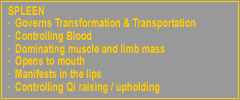Acupuncture 101 – Examinations of the Spleen
part 3 of a 5 part series
Under the scope of acupuncture as a Traditional Chinese Medicine (TCM), pathways or meridians of Qi flow traverse the body and influence specific body regions, organ systems and functionality. Qi is considered a vital life force loosely translated as energy. When Qi is obstructed health imbalances result. The term Spleen is often considered a misnomer and is sometimes translated as Spleen-Pancreas with a close functional co-operation with the stomach and digestion. The Spleen meridian influences the transformation of food into Qi and transportation of nutritive Qi to the extremities (arms and legs). The Spleen system is said to dominate muscles and limbs. This system holds blood in place, controls the upholding action of Qi, opens to the mouth and manifests on the lips. Dry cracked lips or sores within the mouth are some signs displaying an imbalance in this system. In addition, cold limbs and excess body mass or weak arms and legs, bruising easily, varicose veins, and prolapsed organs are also signs of imbalance. The Spleen-Pancreas together with the Stomach manages digestion. This system produces Post-Natal Jing that is used to supplement the more important and limited Pre-Natal Jing that we genetically inherit and that is stored in the Kidney system. Jing is an important supportive substance to our health and longevity. Patients with genetic deficiencies in regards to Pre-Natal Jing may not be able to find a cure but may be able to better manage their condition by optimizing their Post-Natal Jing (optimize diet). The quality of Post-Natal Jing production depends mostly on the quality of food and air intake. Western diseases such as obesity, diabetes, gout, arthritis, anemia, amenorrhea to name a few are often considered imbalances in the Spleen-Pancreas system.
 When the Spleen system is not functioning properly it doesn’t create pure Qi but instead creates a condition called dampness, which can lead to excess mucus and phlegm production consequently impacting the Lung system. Cold foods (iced drinks), heavy foods (meat), and sweet foods can overwhelm this system. Tiredness after a meal is a common symptom that demonstrates a deficiency in the ability to process what was eaten. The USA has a cultural diet that emphasizes sweets which overwhelm the Spleen system. Diabetes being very prevalent in the USA proves this point. High fructose corn syrup, a simple sugar is a common ingredient in practically every processed food and is best avoided. A good start to promoting a balanced Spleen-Pancreas system would be to avoid sugar, overeating, heavy food combinations, cold foods and cold drinks. Any food or drink should be room temperature or warm for optimal digestion.
When the Spleen system is not functioning properly it doesn’t create pure Qi but instead creates a condition called dampness, which can lead to excess mucus and phlegm production consequently impacting the Lung system. Cold foods (iced drinks), heavy foods (meat), and sweet foods can overwhelm this system. Tiredness after a meal is a common symptom that demonstrates a deficiency in the ability to process what was eaten. The USA has a cultural diet that emphasizes sweets which overwhelm the Spleen system. Diabetes being very prevalent in the USA proves this point. High fructose corn syrup, a simple sugar is a common ingredient in practically every processed food and is best avoided. A good start to promoting a balanced Spleen-Pancreas system would be to avoid sugar, overeating, heavy food combinations, cold foods and cold drinks. Any food or drink should be room temperature or warm for optimal digestion.
Christopher Carlow, D. Ac.Doctor of Acupuncture June 20, 2008







